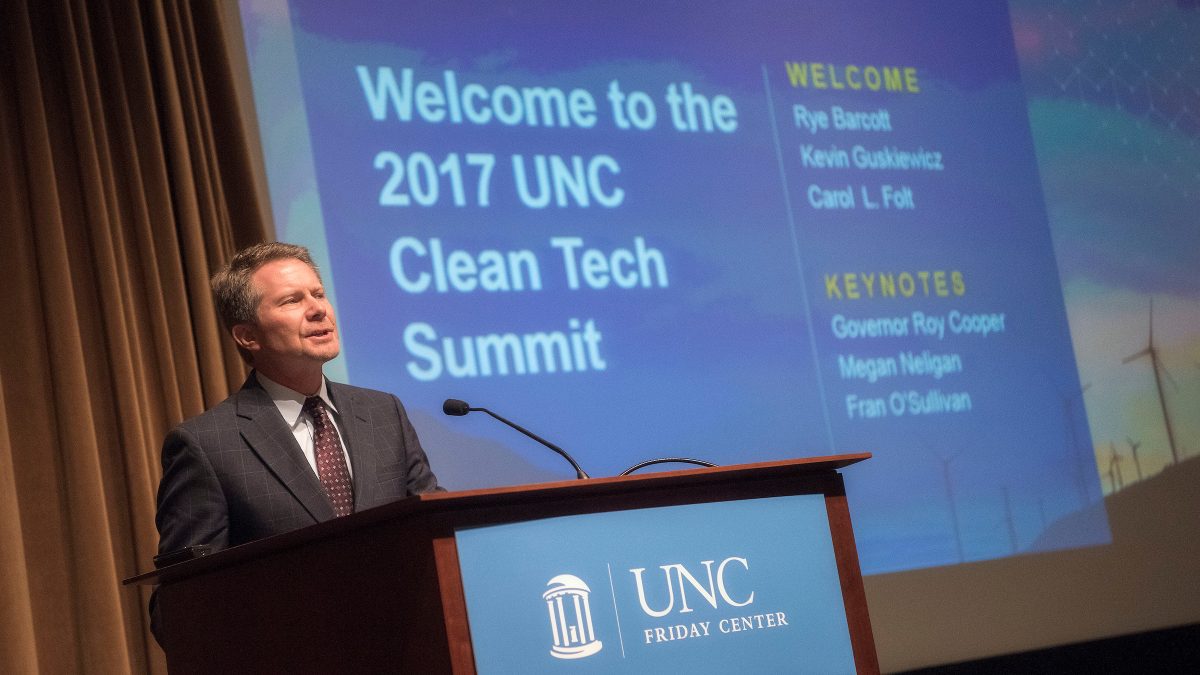‘Time for innovation’
A clean technology summit brought together more than 1,000 interested parties for panels, workshops, mentoring and networking.

The future of North Carolina’s economy will depend largely on the success and innovation of the clean technology industry, which has created nearly 10,000 jobs in the state in the past decade.
That was one of the main points made Thursday on the opening day of the fourth-annual UNC Clean Tech Summit held at the University of North Carolina at Chapel Hill.
“We have to keep moving in that direction,” Gov. Roy Cooper, one of the event’s keynote speakers, said on the economic growth in the industry. “Many of our rural areas and our smaller cities still haven’t recovered from the lost jobs during the Great Recession. Now is the time for innovation. Now is the time for entrepreneurship. It will help us grow a more robust economy.”
The UNC Clean Tech Summit, hosted by the Institute for the Environment and the Center for Sustainable Enterprise at UNC Kenan-Flagler Business School, brought together more than 1,000 academics, government officials, industry professionals and students for panels, workshops, mentoring and networking.
This year’s two-day event focuses on four themes: innovation between universities and industry; clean energy and clean technology; technological breakthroughs in food security and sustainable farming; and the value of water for energy production.
“This Summit is dedicated to bringing together the best and brightest professionals in business, policy and academia from across the state and the region to have important discussions that can lead to improving our leadership and growth,” Chancellor Carol L. Folt told the participants.
The collaboration between universities, government, business and non-profits could turn North Carolina into a clean technology powerhouse, said Greg Gangi, the associate director for education at UNC’s Institute for the Environment.
“We want to find a way to create synergy between academia, industry and government,” he said. “I think if Duke, UNC and NC State were to work together on certain identified issues, that we can really become a powerhouse. Through collaboration we can boost research, we can boost the number of start-up companies that we’re producing in this region.”
Folt moderated a panel that explored the partnerships between universities and the private sector as a way to advance clean tech innovation in the region.
“This is a great opportunity for us to leverage much that is going on in the universities with the exciting ways things are changing in industry,” Folt said. “There is an expanding role for higher education in this.”
A key to building these partnerships and promoting change, Folt said, will be getting students and faculty involved with industry and the private sector.
While collaborating to find solutions to some of the world’s toughest programs is the biggest goal of the Summit, Gangi also wanted the event to serve as a networking event for students looking for jobs and internships.
Participating in the conference really opens up the students’ eyes, Gangi said.
“If we want to teach our students about entrepreneurship, there’s no better way than getting in at the ground level at a start-up company,” Gangi said. “We have a lot to contribute and I think this has been a great way to focus our attention on what UNC can contribute to this area.”




